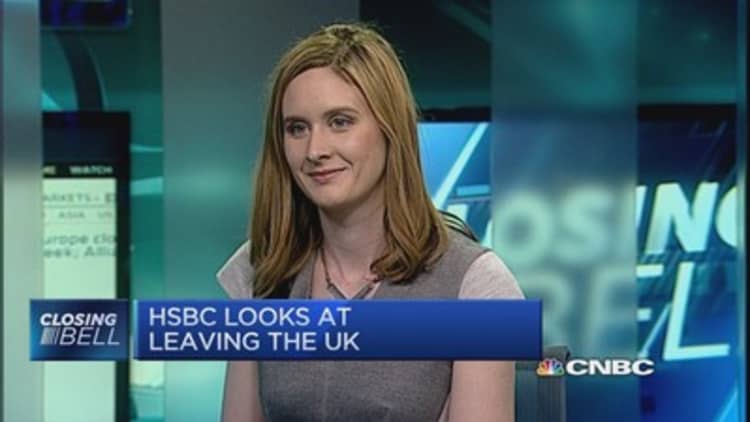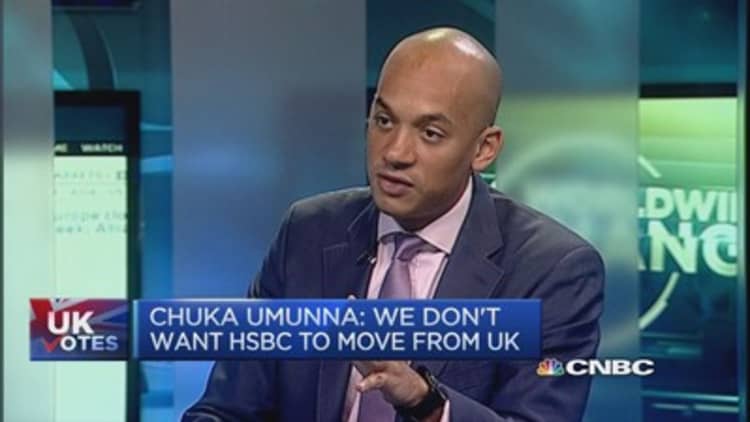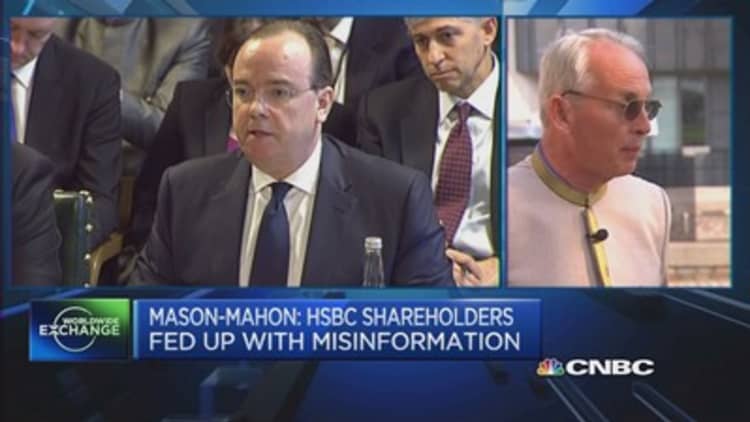
HSBC Chairman Douglas Flint told CNBC that relocating the bank's headquarters back to Hong Kong "would be potentially interesting," after the bank's annual general meeting (AGM) on Friday.
The bank hit headlines earlier on Friday, after it said that it was considering moving from London, citing worries about the U.K. leaving the European Union as one of its reasons.
"We think staying in the EU is a less risky option for the U.K.," Flint told reporters on Friday.
Flint refused to be drawn on how long it would take to decide where, and if, HSBC would be headquartered. He added that the main reason for the timing of the announcement was the global regulatory changes to banking since the credit crisis, rather than because of next month's U.K. election.
Historical ties
The bank was previously based in Hong Kong and relocated to London in 1993 following its takeover of the U.K.'s Midland Bank.
While it has periodically reviewed its base since then, HSBC Deputy Chairman Simon Robertson said that this was a much bigger review than previous ones.
There is already some speculation that HSBC, one of the world's biggest banks, may update on its plans around its interim results, due in August.
In a statement this Friday, the Hong Kong Monetary Authority (HKMA) said that HSBC was the largest bank in Hong Kong and had deep historical links to the territory, according to media reports.
"The HKMA takes a positive attitude should HSBC consider relocating its headquarters back to Hong Kong," the body said, according to the "Financial Times" newspaper.
Politicians from the opposition Labour Party were quick to use HSBC's announcement as an excuse to attack the ruling Conservative Party, which has pledged a referendum on EU membership if it is re-elected at national elections next month.
HSBC warning may not be last

On Friday, the shadow Business Secretary said that more companies might consider moving their headquarters away if the Conservatives were voted back into power.
"I do not believe this will be the only... large institution we see listed here in London making these kinds of statements at their AGMs. I think if we see the Conservatives continue in office they are all going to have to make statements about this," Labour's Chuka Umunna told CNBC on Friday.
"This is really quite significant, because here you have one of the biggest banks in the world saying that if the U.K. leaves EU that will be significant adverse event," he added later.
While other business leaders have express concerns about Britain's uncertain future in the EU, the U.K. bank levy—which HSBC paid around £750 million towards last year—is also believed to be a large factor in HSBC's considerations.
On Friday, Hargreaves Lansdown, a FTSE 100-listed investment management firm, said that the bank levy had reduced the value of U.K. bank shares by around £25 billion ($38 billion) since its introduction.
Analysts at Bernstein said a move to Hong Kong would "make total sense" for HSBC and said that U.K. rival Standard Chartered was likely to follow suit.
"We think the move to Hong Kong (obviously) makes total sense. Releases almost $14 billion in value; is a move that has already been welcomed by KHAM and one that can be done at minimal cost," Bernstein said in a research note on Friday.
Also on Friday, the Institute of Directors warned that other U.K. stalwarts might look to relocate.
"From uncertainty over the U.K.'s relationship with Europe, to the threat of higher taxes on companies and individuals, nobody can be surprised that major international organisations keep their relationship with the UK under review," said Simon Walker, director general of the U.K. business lobbying group, in a statement.
"This warning from one of the U.K.'s biggest companies should force politicians to pay heed to the effects of both their policies and their rhetoric, and to take seriously the threat of a major withdrawal from the British economy."
Bernstein added that a relocation by HSBC could increase the bank levy burden on its competitors remaining in the U.K.
"Recouping the loss from the likes of Lloyds, RBS and Barclays could see their levy increase 70 percent," the analysts said.
HSBC 'paid a heavy price'

Bosses at HSBC, one of the most systemically important banks in the world, have been accused of turning a blind eye to alleged tax evasion at its Swiss private banking arm.
At the AGM, both Flint and HSBC Chief Executive Stuart Gulliver faced stinging criticism over their management, with one shareholder suggesting Flint should face criminal prosecution.
Flint replied that HSBC had "paid a heavy price" for its activities. He said he hoped to see more individuals prosecuted over the allegations of misbehavior soon.
Deputy Chairman Robertson told the meeting the board had "full confidence" in both Flint and Gulliver.
Both executives are expected to stay in situ until at least 2017, when HSBC's deferred prosecution agreement with U.S. Authorities—essentially an opportunity to put its house in order—will expire.
However, Flint confirmed there would be a "further refresh of the board this year."
A more detailed outline of plans to reshape HSBC is expected on June 9.
"We have absolutely no interest in doing business with clients who are evading taxes," Gulliver told shareholders.
Salary rebellion
There was a significant rebellion against the HSBC director's pay report, with people holding shares worth 24 percent of HSBC stock voting against it.
At one point, shareholder Michael Mason Mahon offered Gulliver a Panama hat, in reference to Gulliver's use of a Panamanian company to park his HSBC pay.
Meanwhile, the issue of falling stock prices was raised by more than one shareholder.
New York-listed shares of HSBC are down around 2.4 percent on the year and 10.2 percent on April 2014.
"We're just as disappointed as anybody in the share price performance," Robertson. He pointed out that the bank had continued to pay out dividends to investors.
Follow us on Twitter: @CNBCWorld

